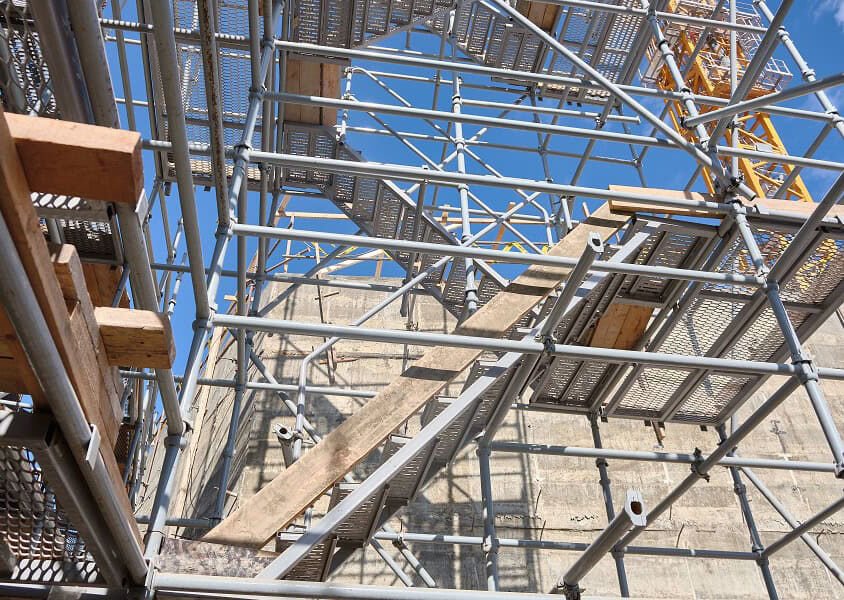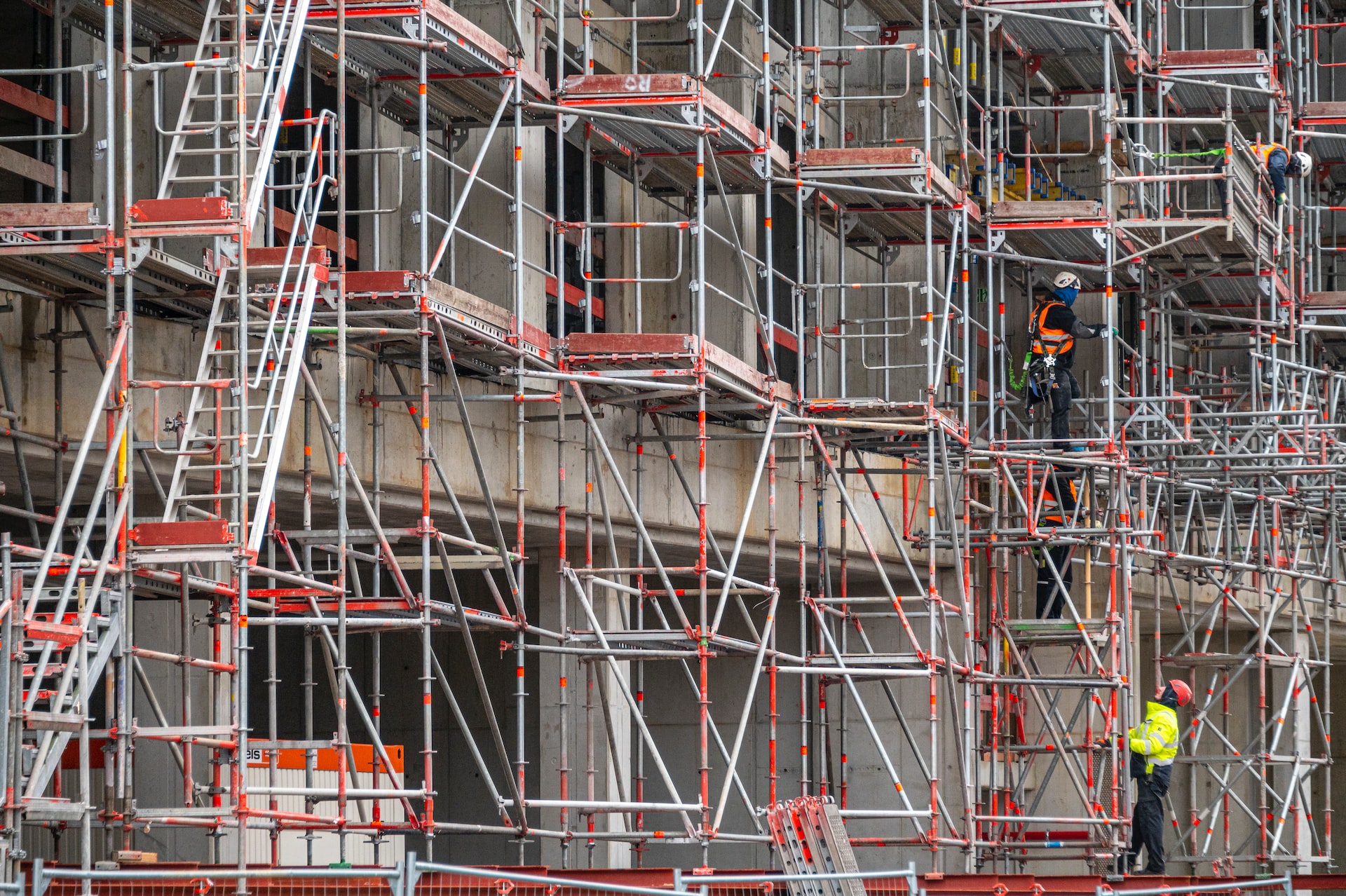Exploring the Numerous Kinds of Scaffolding Utilized in Building Projects
The building and construction market counts greatly on various kinds of scaffolding to fulfill certain project needs, each offering distinct advantages and applications. Typical frame scaffolding provides a tough foundation for basic tasks, while suspended scaffolding is important for work on skyscraper frameworks. Other alternatives, such as system and rolling scaffolding, cater to effectiveness and movement, respectively. The cantilever variant verifies invaluable in metropolitan environments where area is constricted. Understanding the subtleties of these scaffolding types is essential for enhancing safety and efficiency on building websites, prompting a closer exam of their unique attributes and applications.

Typical Structure Scaffolding
Conventional framework scaffolding is among the most extensively made use of methods in the construction sector because of its robustness and adaptability. This system contains upright and horizontal structures that are put together to create a steady system for materials and employees. The main parts include vertical blog posts, straight journals, and diagonal braces, which with each other offer a strong structure that can support considerable loads.
One of the crucial benefits of traditional framework scaffolding is its flexibility to various building projects, ranging from property structures to huge commercial structures. The modular design enables simple setting up and disassembly, making it efficient for both short-term and long-lasting projects. Additionally, the system can be personalized in height and size, suiting various structure layouts and website problems.
Safety is critical in scaffolding applications, and traditional frame systems are geared up with guardrails and toe boards to stop drops and make certain employee defense. In addition, normal evaluations and adherence to safety and security regulations are essential in preserving the stability of the scaffold. Overall, traditional framework scaffolding stays a basic selection in the construction sector, giving a trusted system for labor and enhancing total task performance

Suspended Scaffolding
Put on hold scaffolding provides an one-of-a-kind solution for building and construction jobs that call for access to elevated surfaces, especially in situations where standard structure scaffolding might be unwise. This sort of scaffolding is generally suspended from the roof or upper degrees of a framework, using a system of systems, wheels, and ropes to create a working area that can be readjusted to numerous heights.
One of the main advantages of suspended scaffolding is its versatility. It can be quickly rearranged or reduced to fit adjustments in construction requirements, making it excellent for tasks such as window installation, façade job, and upkeep on skyscrapers. Furthermore, the marginal impact of put on hold scaffolding allows for better usage of ground space in city settings, where room is frequently restricted.
Safety and security is an essential consideration in the use of put on hold scaffolding. On the whole, put on hold scaffolding provides a effective and efficient service for accessing hard-to-reach areas in numerous building and construction situations, improving both efficiency and safety on website.
System Scaffolding
System scaffolding, typically considered a modern-day option in the scaffolding industry, contains pre-engineered elements that can be rapidly constructed and adapted for numerous construction tasks. Scaffolding. This type of scaffolding is identified by its modular style, which enables versatility and performance on job websites, suiting architectural needs and different elevations
Usually made from high-strength steel or light weight aluminum, system scaffolding provides boosted toughness and stability. The components consist of vertical articles, straight journals, and diagonal braces, which adjoin securely, making sure a durable structure. The design commonly includes standardized installations, streamlining assembly and disassembly processes, consequently reducing labor time and expenses.

Rolling Scaffolding
Moving scaffolding is a functional choice to conventional fixed scaffolding, developed for mobility and convenience of use on building and construction sites. This kind of scaffolding includes a platform sustained by frameworks with wheels, allowing employees to easily relocate it as required. The movement attribute dramatically boosts efficiency, as it minimizes downtime connected with dismantling and putting together fixed scaffolding.
Normally created from light-weight products such as aluminum or steel, rolling scaffolding uses a click site strong yet portable solution for jobs requiring regular repositioning - Scaffolding. It is specifically advantageous in tasks such as paint, drywall installment, and electric job, where access to different elevations and areas is required
Safety and security is paramount in rolling scaffolding style, with features such as locking wheels to stop unintentional activity when in usage, and guardrails to shield workers from falls. Furthermore, find more info lots of designs are flexible in elevation, suiting various job demands.
Cantilever Scaffolding

The layout of cantilever scaffolding normally entails making use of braces or arms anchored to a structure or structure, enabling the platform to expand external safely. Safety is extremely important; therefore, these scaffolds must be crafted to stand up to numerous lots and environmental problems. Normal assessment and maintenance are necessary to make certain structural stability and employee security.
Cantilever scaffolding is favored for its adaptability and efficient use of space, making it a preferred option in city environments where room restraints are common. It promotes easier access to high altitudes, inevitably contributing to the overall effectiveness of building and construction jobs. Just like all scaffolding kinds, correct training and adherence to safety and security criteria are vital for employees making use of cantilever scaffolding.
Verdict
Typical structure scaffolding supplies stability, while suspended scaffolding offers convenience for raised tasks. System scaffolding helps with fast setting up, and rolling scaffolding boosts wheelchair for varying job environments.
Traditional framework scaffolding gives a strong foundation for basic tasks, while suspended scaffolding is necessary for job on skyscraper structures.Moving scaffolding is a functional my link choice to traditional set scaffolding, developed for flexibility and ease of usage on construction websites. As with all scaffolding types, appropriate training and adherence to safety and security criteria are vital for workers utilizing cantilever scaffolding.
Traditional frame scaffolding gives stability, while put on hold scaffolding uses versatility for raised jobs. System scaffolding assists in fast assembly, and rolling scaffolding boosts movement for differing job settings.